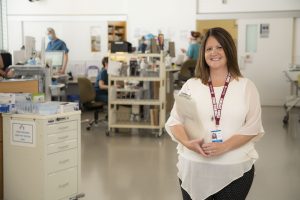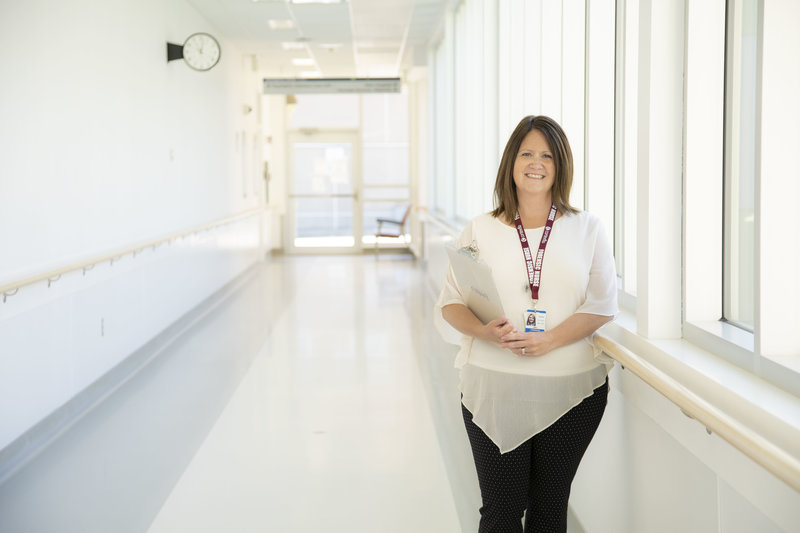Forensic nursing may be a relatively young field in Canada but it has become one of the fastest growing disciplines of nursing. Forensic nurses bridge the gap between law and medicine by providing compassionate care to victims of violence and abuse while gathering evidence to support law enforcement. As an early leader in shaping forensic nursing education in Canada, BCIT is committed to providing training and expertise that ensures strict forensic standards are met for quality patient care.
In its latest effort to foster high standards of training within the field of forensic nursing, BCIT Forensic Health Sciences has received accreditation from the International Association of Forensic Nurses (IAFN) for two courses as having met the training content of the IAFN Sexual Assault Nurse Examiners (SANE) Education Guidelines. This accreditation recognizes BCIT as Canada’s first IAFN-approved provider of SANE.
“This official recognition by the IAFN, an accredited approver by the American Nurses Credentialing Centers Commission on accreditation is a huge achievement and ensures learners that the courses –Forensic Nurse Examiner Core Education – Adult and Pediatric Sexual Violence Examiner – meet eligibility requirements for attendees to sit for Sexual Assault Nurse Examiner-Adult/Adolescent(SANE-A) and the Sexual Assault Nurse Examiner-Pediatric (SANE-P) board certification exams. Nurses who complete this education will obtain standardized, evidence-based practice to make sure they achieve quality outcomes for patients,” said Colin Harris, Program Coordinator for BCIT Forensic Health Sciences and board-certified Advanced Forensic Nurse.
The BCIT Forensic Nursing program started as Canada’s first classroom-delivered specialty certificate program in forensic health sciences in 2006 and as the need for advanced education in this field increased, forensic health sciences kept pace.

“The importance of accredited forensic nursing educational training speaks volumes for expertise and ensures that strict forensic standards are met. Being accredited is important when you are looking at credibility and a trained forensic nurse examiner – especially when providing evidence of education and training to the court as an expert witness. Having accredited courses in BCIT’s Forensic Health Sciences program means that we have attained a level that meets or exceeds standards that were developed by experts in the forensic nursing field,” explained Aimee Falkenberg, BCIT Lead Instructor, Forensic Nurse Examiner, Clinical Coordinator for the Nanaimo Regional General Hospital Forensic Nursing program, and Clinical Consultant for North Island Forensic Nursing teams. “This knowledge, high level training, and expertise can also help forensic nurse examiners sit on further high-level board examinations in this field. This is an honour I hold closely as the lead instructor of the forensic nurse examiner course at BCIT and, at the end of the day, the education and highest of standards are for the survivors that are seeking forensic nursing care after their worst day.”
Tara Wilkie, Forensic Nurse Examiner, SANE-A and Co-Coordinator of Forensic Nursing Services in Surrey Memorial Hospital’s Emergency Department added, “Having Forensic Nurse Examiner Education meet the International Association of Forensic Nurses Educational Guideline is an achievement that will substantiate the necessary advancement of forensic nursing in Canada. In addition, this approval will provide the opportunity for Forensic Nurse Examiners to expand their expertise and knowledge as they work to achieve International Sexual Assault Nurse Examiner certification for adults, adolescent and pediatric populations. BCIT has once again set the bar high in becoming the first Institution in Canada to receive this approval, which is a testament to the outstanding commitment to their students extending beyond the classroom, but also in their continued efforts to address violence.”
All BC registered nurses interested in gaining employment in the role of Sexual Assault Nurse Examiner (SANE) or Forensic Nurse Examiner (FNE) are required to take the BCIT Forensic Nurse Examiner Education courses.
(Photo credit for featured image: Island Health)

Delighted at this outstanding achievement by BCIT Forensic Health Sciences Program! Again, the Program leads the way in Forensic Healthcare Education in Canada. Congratulations!
Thank you Sheila, that means a lot to us in the program considering your contributions to the field over the years.
This is a well-deserved and hard-earned recognition for the excellence and quality of the Forensic Nurse program at BCIT. I congratulate and commend Sheila Early, Aimee Falkenberg, Colin Harris, Tara Wilkie, and their team of skilled instructors. Way to go! Winston Sayson, Q.C. (retired Crown Counsel)
Thank you so much Winston, You have been a big part of the success of our program and your willingness to share your knowledge over the years, in addition to your support of this important service has been invaluable!
Congratulations all! I am also so proud of the ground-breaking advances this important program has achieved over the years. A big thanks to Sheila for her tenacity and vision over the years, and to the many awesome team members who carry the torch today, building on the strong foundation. Keep soaring!! Kathy
Congratulations on this wonderful achievement.
So proud of Aimee Falkenberg! I was her mentor when she was a public health nursing student. Keep up the important work Aimee! Sincerely Debbie Wickstrom retired RN BSN
This project was my baby and I am so happy that the accreditation all went through. This program is such a valuable resource and through the use of technology, Nurses can enrol, learn and apply these skills in some of the most difficult to reach populations like rural and remote areas, regardless of where the Nurse is located at this time. We truly are breaking down barriers here and creating more opportunities for both Nurses and patient populations either through education or the services they are going to be able to receive. Personally, I would like to see this offered to undergrads as an elective option because it will provide a great insight into recognizing and potentially preserving valuable forensic matter, among many other valuable topic areas included in this education. Perhaps that will be my next project…trying to find a way to reach (and inspire) more Nurses in the Forensic Nursing realm.
Are these two courses still offered?
Hi Camille, please reach out to BCIT Forensics. Thanks!